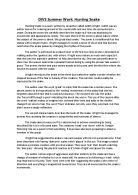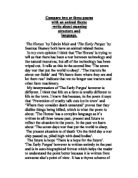‘Hunting Snake’ is about Wright’s encounter with a snake. The poem has a very simple structure, with four lines in each stanza and without any complex rhymes and rhythms. The poet’s choice of words is mostly one-syllable words therefore making this poem very conversational. Like ‘Horses’, this poem starts off with a peaceful, serene setting without a slight hint of danger however, in the third stanza, Wright uses the word ‘froze’. This foreshadows peril and creates suspense in the reader. She follows up with a ‘black snake’. This creates images of something dark and dangerous therefore instilling fear in the reader. Muir also uses this poetic technique to create a sudden effect when he starts the poem with pleasant emotions and then suddenly, changing it to the complete opposite by using words such as ‘seraphim of gold’ and ‘ecstatic monsters’. This is how the poets successfully create a shock effect.
Edwin Muir uses monosyllabic rhyming in couplets throughout the poem such as ‘done’ and ‘sun’ or ‘flakes’ and ‘snakes’. This creates pattern, structure and unity for the reader so that when read out, the reader has a sense of what to expect. In this way, the poet gives effect to the poem.
Muir uses ambivalence to show the dual emotions throughout the whole poem. In this third and fourth line of the second stanza, the tone is melancholic, almost torturous, when he uses the simile ‘pistons’ to describe the hooves of the horses ‘in an ancient mill’. Muir compares the hooves of the horses’ to an object: overworked and dominated over. This evokes a sense of pity in the reader. However, in the third stanza, he suddenly speaks of them differently. He now depicts the horses as ‘conquering’ and possessing the power to turn ‘the field to brown’, in other words destroying nature. Wright also displays likeness to this when she describes the ‘intent’ of the snake as ‘fierce’.
Muir describes the ‘broad-breasted’ horses marching into the sinking sun and the ‘light’ flowing of them in ‘flakes’. This might mean that the horses are so outstanding that even the ‘light’ or the ‘sun’ does not shine as brightly as the horses. This is a figure of speech. This shows us the awe the poet is in of the horses and the effect nature has on him.
In the third stanza of ‘Hunting Snake’, Wright uses alliteration in the words ‘food’, ‘fled’ and ‘fierce’ hence putting a lot of stress and emphasis of those words. These words reflect the hostile and forceful temperament of the snake. Despite this, the poet’s mind was still incapable of thinking for she was stunned by the beauty of the snake. Edwin Muir describes the horses ‘eyes’ as gleaming with ‘cruel apocalyptic light’. This creates a terror aura however not enough to stop the poet from looking as he was also stunned by their beauty. He talks about their ‘manes’ leaping in the ‘ire of the wind’. This is the way it flows when the horses are running. This line also seems to insinuate a hint of reverence of perhaps, their audacity to throw caution to the wind. Muir might have envied how care-free and willing to take risks horses are. Both poets exhibit immense wonder for nature – enough to overtake their fear.
The last thing both poems have in common is their metaphorical meanings. Both poets are deeply intertwined with roots of the past therefore their poems reflect this. Muir says that he ‘must pine’ for his childhood when he was still in awe of horses and before the natural environment was tainted by all the whims of men. The poet reluctantly lets go and moves on. In ‘Hunting Snake’, the snake captivates Wright. Wright describes the snake as a ‘cold, dark and splendid’ creature. All these words are in opposition to each other hence, showing us the fearful- awe experienced by the poet. The word ‘dark’ connotes a mystery which leads to the spark of curiosity Wright might have felt to perhaps, follow the snake. However, that would put her in peril; thus, she ‘took a deeper breathe of the day’ and moves on. This is the dual meanings of both the poems – what one wants is different from the reality and, that cannot be changed. The only solution to this is to move on, which is exactly what both poets did. In this way, both Judith Wright and Edwin Muir vividly conveys the power of nature and uses it to express their emotions.
By: Emily Chen (Year 11)









